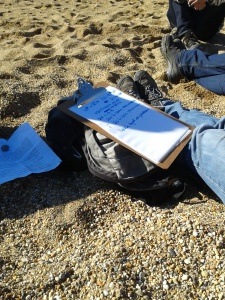How do you go about looking for oil? This was the question posed to a group of PhD students from the BP Institute at Cambridge University this weekend, on a field trip in Dorset led by Dr Bryan Lovell, Dr Andrew Leonard and BPI’s Dr Andy Woods. Bryan had invited me to join them and it was a fascinating, inspiring trip, taking in Kimmeridge Bay, Lulworth Cove, the Wytch Farm Oil Field and Bridport Sands. It was great to be given such an insight into the complexities of reservoir access and production – the scientific, social and environmental factors – as well as to meet such a wide range of researchers. I’ll post a full report at some point – but for now here is a selection of pictures from the weekend.

The nodding donkey at Kimmeridge Bay. The UK’s oldest working oil pump, it produces around 80 barrels of oil a day

The Crumple, Lulworth Cove – layered Purbeck rock strata folded by the collision of two continental plates





